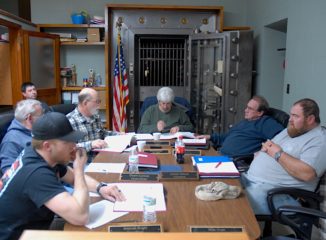
By Randy Arrington
STANLEY, Jan. 29 — In 2018, Page County received 55.15 inches of rainfall, according to Stanley weather tracker Carl J. Quintrell III. That’s nearly 15 inches of rain above the annual average.
While it may have caused problems for many farmers, it was a blessing for the Town of Stanley.
The additional rainfall generated additional leachate at the Battle Creek Landfill, which is treated at the Stanley wastewater plant. That leachate, or liquid runoff of decomposing trash, turned into higher revenues for Stanley. The higher volume drove a 5.3-percent growth spurt in the town’s financial standing.
“I wouldn’t expect the Town to grow 5 percent every year,” financial consultant Christopher Montgomery cautioned council members, “but I think you will be pleased with this audit report.”
The CPA with Young, Nicholas, Branner & Phillips, LLP of Harrisonburg, presented the highlights of the FY18-19 audit of the town’s finances. He described it as having “no bad parts.”
The audit showed the town’s overall financial standing had grown from $3.5 million to just over $3.7 million in one fiscal year. While several areas brought in additional revenue for the town, the processing of the county’s leachate from the landfill proved to be the biggest contributor.
“The leachate is a good revenue source for us,” Town Manager Terry Pettit told council members, “but we have to remember it creates extra cost at the treatment plant too.”
In FY18-19, operating revenues for the Park Fund finished the year $17,898 more than budgeted; however, expenses came in $67,495 more than budgeted. As additional revenues came in, the town put more into parks to keep up with a growing schedule of events and higher volume at the Hawksbill Pool.
During the same fiscal year, Stanley reduced its long-term debt by $189,983. The Town had $182,048 in capital additions.
After hearing a positive audit report, the Stanley Council turned toward the less pleasant task of discussing the challenges facing them as they enter discussions of the FY20-21 budget. Among those challenges or goals are:
- Maintain current events
- Construction of amphitheater at Ed Good Park
- Splash pad at Hawksbill Pool
- Completion of Well No.7 water line
- Al Good Drive water project
- Infrastructure maintenance
- Boundary line adjustment
- Higher wages for town’s public works employees
The amphitheater and splash pad projects at town parks come with some help. Pioneer Bank has agreed to match a $35,000 anonymous donation to fund the amphitheater, while a $21,000 grant spread out over three years will fund the splash pad.
Other potential items mentioned by council members included building a fence at Ed Good Park to regulate crowds at events, and potentially hiring another Recreation Director for the town.
“What do we have to raise to get those things done?” Pettit posed to council. “We will have to increase something.”
Council members discussed various ways to increase revenues to pay for the project list, such as adjusting billing cycles or stronger enforcement of the requirement for a business license. But the consensus around the table seemed to be that one (or more) of the town’s fees or taxes will be need to be raised in order to pay for what they feel are priorities.
The two-hour discussion was informal and simply served as a starting point for upcoming budget discussions. Those deliberations will continue next month and through June, when a final budget must be in place before the new fiscal year starts on July 1.




Be the first to comment